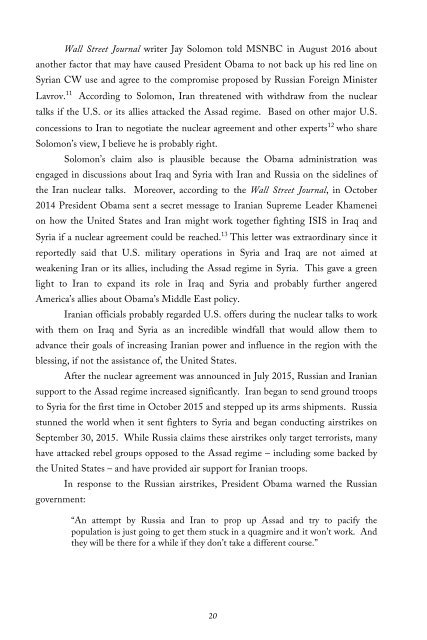You also want an ePaper? Increase the reach of your titles
YUMPU automatically turns print PDFs into web optimized ePapers that Google loves.
Wall Street Journal writer Jay Solomon told MSNBC in August 2016 about<br />
another factor that may have caused President Obama to not back up his red line on<br />
Syrian CW use and agree to the compromise proposed by Russian Foreign Minister<br />
Lavrov. 11 According to Solomon, Iran threatened with withdraw from the nuclear<br />
talks if the U.S. or its allies attacked the Assad regime. Based on other major U.S.<br />
concessions to Iran to negotiate the nuclear agreement and other experts 12 who share<br />
Solomon’s view, I believe he is probably right.<br />
Solomon’s claim also is plausible because the Obama administration was<br />
engaged in discussions about Iraq and Syria with Iran and Russia on the sidelines of<br />
the Iran nuclear talks. Moreover, according to the Wall Street Journal, in October<br />
2014 President Obama sent a secret message to Iranian Supreme Leader Khamenei<br />
on how the United States and Iran might work together fighting ISIS in Iraq and<br />
Syria if a nuclear agreement could be reached. 13 This letter was extraordinary since it<br />
reportedly said that U.S. military operations in Syria and Iraq are not aimed at<br />
weakening Iran or its allies, including the Assad regime in Syria. This gave a green<br />
light to Iran to expand its role in Iraq and Syria and probably further angered<br />
America’s allies about Obama’s Middle East policy.<br />
Iranian officials probably regarded U.S. offers during the nuclear talks to work<br />
with them on Iraq and Syria as an incredible windfall that would allow them to<br />
advance their goals of increasing Iranian power and influence in the region with the<br />
blessing, if not the assistance of, the United States.<br />
After the nuclear agreement was announced in July 2015, Russian and Iranian<br />
support to the Assad regime increased significantly. Iran began to send ground troops<br />
to Syria for the first time in October 2015 and stepped up its arms shipments. Russia<br />
stunned the world when it sent fighters to Syria and began conducting airstrikes on<br />
September 30, 2015. While Russia claims these airstrikes only target terrorists, many<br />
have attacked rebel groups opposed to the Assad regime – including some backed by<br />
the United States – and have provided air support for Iranian troops.<br />
In response to the Russian airstrikes, President Obama warned the Russian<br />
government:<br />
“An attempt by Russia and Iran to prop up Assad and try to pacify the<br />
population is just going to get them stuck in a quagmire and it won't work. And<br />
they will be there for a while if they don’t take a different course.”<br />
20



